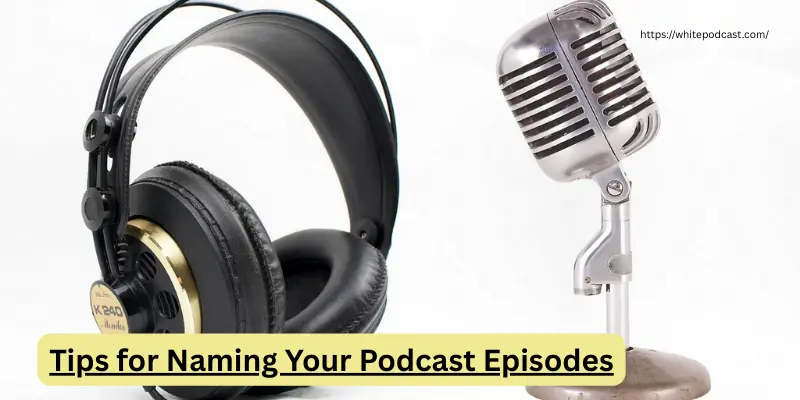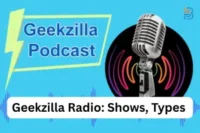Best Tips for Naming Your Podcast Episodes Effectively
Published: 7 May 2025
Naming your podcast episodes may seem like a small task, but it can have a significant impact on your show’s success. A strong episode title can grab attention, boost engagement, and improve discover ability in podcast directories and search engines. It’s often the first thing potential listeners see, so it’s crucial to get it right.
Podcast titles not only need to be catchy but also descriptive, SEO-friendly, and true to your content. The right episode name can draw in listeners who might otherwise scroll past your podcast in a crowded market. On the other hand, a poorly named episode could cause your podcast to be overlooked.

The Importance of Episode Titles
Podcast episode titles are much more than just labels for your content—they play a critical role in both attracting listeners and boosting your podcast’s discoverability. Here’s why episode titles should never be overlooked: podcast name generator
First Impressions Matter
When someone discovers your podcast, the title of your episode is one of the first things they’ll notice. If your title catches their eye, they’ll be more likely to hit play. A great title sets the tone and encourages potential listeners to engage with your content. If your title is unclear or too generic, they might pass it by. naming convention television
Impact on Discoverability
A well-crafted episode title also plays a key role in how discoverable your podcast is. Search engines, podcast directories, and platforms like Apple Podcasts, Spotify, and Google all use episode titles to help people find your content. If your title includes relevant keywords, it increases the chances of showing up in search results, making it easier for new listeners to find your show.
Increased Click-Through Rates
Engaging episode titles lead to higher click-through rates (CTR). A title that clearly explains what the episode is about while sparking curiosity or offering value will motivate listeners to click and listen. The more compelling the title, the higher the chances of attracting a wider audience and retaining them long-term.
Building Consistency and Branding
Your episode titles are also an important part of your podcast’s brand identity. Over time, they help establish the style and tone of your content. If you consistently use descriptive, valuable titles, your audience will come to expect the same level of clarity and value in every episode. This builds trust with your listeners and strengthens your brand.
Sets Expectations for Content
The title should give listeners an immediate understanding of what the episode is about. When listeners know exactly what they can expect, they’re more likely to tune in. For instance, if your episode promises to teach something specific, make sure the title reflects that by highlighting the value proposition.
Best Practices for Crafting Effective Episode Titles
Now that you understand the importance of episode titles, let’s explore the best practices for crafting titles that attract listeners, enhance SEO, and accurately represent your content. Here are key strategies to follow: types of interview podcast
Focus on Clarity and Simplicity
Your title should immediately communicate the essence of your episode. Avoid jargon, complicated words, or anything that may confuse the listener. A clear, straightforward title will resonate more with potential listeners, and they’ll be more likely to hit play. For example, “How to Grow Your Podcast Audience in 30 Days” is clear and tells exactly what the episode offers.
Incorporate Relevant Keywords for SEO
Including specific keywords in your title helps your episode become discoverable. Think about what potential listeners might be searching for. Use terms that are directly related to the episode’s topic and that your target audience is likely to type into search bars. For instance, if your episode is about podcasting tips, include keywords like “podcast tips,” “how to podcast,” or “podcasting advice.” Just be sure to do it naturally—don’t stuff your title with too many keywords.
Be Specific and Descriptive
Rather than vague or generic titles like “Episode 25,” focus on specific topics that give listeners a reason to tune in. A title like “5 Tips for Better Podcast Audio Quality” is much more compelling than simply “Podcasting Tips.” Specific titles also help your episodes stand out and show your audience exactly what value they can expect.
Create Intrigue Without Being Misleading
A bit of curiosity can go a long way in getting listeners to click on your episode. However, it’s important to strike the right balance. Titles like “The Secret to Growing Your Podcast Audience” or “What I Wish I Knew Before Starting a Podcast” spark curiosity, but they don’t promise something misleading. Avoid clickbait, as it can lead to listener dissatisfaction and a loss of credibility.
Use Numbers and Lists When Appropriate
List-based titles are incredibly popular because they give listeners a clear idea of what they’re going to get. Titles like “10 Ways to Improve Your Podcast” or “3 Common Podcasting Mistakes You Should Avoid” promise actionable advice and a structured, easy-to-digest episode. Numbers also make titles more appealing and easier to scan.
Keep It Short and Sweet
While you want to be descriptive, keep your titles concise—ideally under 70 characters. This ensures your title doesn’t get cut off on podcast platforms and search engines. Shorter titles are also easier for listeners to read quickly and decide whether they want to click on your episode.
Consider Using Power Words
Power words like “ultimate,” “best,” “essential,” “guide,” “master,” or “proven” can help your title stand out. They promise value and emphasize the importance of what your episode is offering. For example, “The Ultimate Guide to Podcast Monetization” is likely to attract listeners who are serious about learning how to make money from their podcast.
Types of Episode Titles That Work
How-To Titles:
- Example: “How to Start a Podcast in 7 Easy Steps”
- Why it works: Offers clear, actionable advice that solves a listener’s problem.
Listicle Titles:
- Example: “10 Tips to Improve Your Podcast Sound Quality”
- Why it works: List formats promise quick, digestible tips and attract listeners who want value.
Interview-Based Titles:
- Example: “Interview with [Guest Name]: How to Build a Loyal Audience”
- Why it works: Features a guest’s authority and offers specific insights.
Problem-Solving Titles:
- Example: “Struggling with Podcast Promotion? Here’s What Works”
- Why it works: Directly addresses a common problem and offers a solution.
Curiosity Titles:
- Example: “The Secret to Growing Your Podcast Without Ads”
- Why it works: Sparks curiosity while promising valuable information.
Common Mistakes to Avoid When Naming Episodes
- Clickbait Titles: Misleading titles harm trust and retention.
- Generic Titles: Titles like “Episode 15” offer no value or context.
- Keyword Stuffing: Overloading titles with keywords reduces clarity.
- Vague Titles: Avoid titles that don’t specify the episode’s content.
- Complex Titles: Long or complicated titles confuse listeners.
- Overuse of Punctuation: Excessive punctuation like “!!!” makes titles look unprofessional.
- Lack of Relevance: Ensure the title matches the episode’s core message.
- Avoiding Value Propositions: Don’t skip on what value listeners will get.
- Too Many Numbers: Use numbers strategically—don’t overdo it.
- Not Testing Titles: Never settle on one title without considering alternatives.
Examples of Effective Episode Titles
Looking at real examples can help you better understand what makes an episode title effective. Here are some titles that work well:
“How to Grow Your Podcast Audience in 30 Days”
- Why it works: This title is specific, offers a clear timeline, and speaks directly to a common goal of podcasters—growing their audience.
“10 Tips to Improve Your Podcast Sound Quality”
- Why it works: The use of “10 Tips” clearly indicates actionable advice, and it’s easy to understand the value being offered.
“Interview with [Guest Name]: How to Monetize Your Podcast”
- Why it works: Including the guest’s name and expertise makes the title more authoritative, attracting listeners interested in monetization.
“The Secret to Successful Podcast Promotion”
- Why it works: The word “secret” sparks curiosity, while the title promises a solution to a key issue in podcasting.
“What I Wish I Knew Before Starting a Podcast”
- Why it works: Personal and relatable, this title offers insight and appeals to aspiring podcasters, positioning it as a must-listen.
“How to Master Podcast Editing Without the Overwhelm”
- Why it works: This title addresses a common pain point (overwhelm) while offering a solution (mastering editing), making it highly appealing.
“Podcasting Myths Busted: The Truth Behind the Hype”
- Why it works: Titles with “myth-busting” or “truth” offer a fresh perspective, making them stand out and attract curious listeners.
“Why Most Podcasts Fail and How You Can Avoid It”
- Why it works: It addresses a fear many podcasters have and promises actionable advice to avoid failure.
“3 Common Podcasting Mistakes and How to Avoid Them”
- Why it works: Short, straightforward, and highly actionable, offering a quick takeaway in a digestible format.
“The Ultimate Guide to Podcast Monetization”
- Why it works: “Ultimate Guide” promises a comprehensive resource, which appeals to listeners looking for in-depth information.
Testing and Refining Your Episode Titles
- Monitor Engagement: Track listens, click-through rates, and shares to see which titles perform best.
- A/B Test Titles: Try two versions of a title and measure which one gets more attention.
- Ask for Listener Feedback: Use polls or social media to gather feedback on your episode titles.
- Experiment with Trends: Stay updated on podcasting trends and adjust titles accordingly.
- Use Analytics Tools: Evaluate how different titles impact your podcast’s performance.
- Test Different Formats: Try “How-to,” “Listicle,” or “Interview” styles and see which gets more clicks.
- Adjust for Audience Growth: As your podcast grows, refine titles to meet changing audience preferences.
- Learn from Competitors: Analyze successful podcasters’ titles and adapt strategies that work.
- Refine Based on Data: Use performance data to tweak future titles for better engagement.
- Stay Flexible: Be open to evolving your title strategy as your podcast matures.
Conclusion
Episode titles are more than just labels—they’re essential tools for growing your podcast and engaging your audience. A well-crafted title can increase discoverability, improve listener engagement, and help you build a loyal audience. By following best practices, avoiding common mistakes, and continually testing and refining your titles, you can create episode names that not only attract new listeners but also keep them coming back for more.
Remember, your episode title should be clear, concise, and relevant to the content you’re delivering. It should also provide enough value and intrigue to make potential listeners want to click and listen. With the right approach, you can use episode titles as a powerful tool to elevate your podcast and maximize its impact.
What is the main purpose of a podcast episode title?
a) To give it a creative flair
b) To attract listeners and improve discoverability
c) To summarize the podcast content
d) To make it sound interesting
What type of title works best for improving podcast engagement?
a) Vague and abstract titles
b) Clickbait titles
c) Clear, specific, and descriptive titles
d) Long and complex titles
Why should you avoid keyword stuffing in episode titles?
a) It makes the title hard to read and sounds unnatural
b) It helps with SEO
c) It attracts more listeners
d) It makes the title more catchy
What’s an example of a good “how-to” episode title?
a) “Episode 25”
b) “How to Start Your Podcast in 7 Days”
c) “Podcasting: The Basics”
d) “Uncover the Truth About Podcasting”
Answers:
b
c
a
b
To make your titles SEO-friendly, include relevant keywords that potential listeners would search for. Use terms that are specific to the episode’s content, and avoid keyword stuffing, as it can make the title sound unnatural. Keep the title concise, ideally under 70 characters, to ensure it appears fully in search results.
Monitor engagement metrics like listener growth, click-through rates, and social media interactions. If certain types of titles consistently generate higher engagement, analyze the patterns to understand what works. You can also A/B test different titles and gather feedback from your audience to refine your strategy over time.

- Be Respectful
- Stay Relevant
- Stay Positive
- True Feedback
- Encourage Discussion
- Avoid Spamming
- No Fake News
- Don't Copy-Paste
- No Personal Attacks

- Be Respectful
- Stay Relevant
- Stay Positive
- True Feedback
- Encourage Discussion
- Avoid Spamming
- No Fake News
- Don't Copy-Paste
- No Personal Attacks






